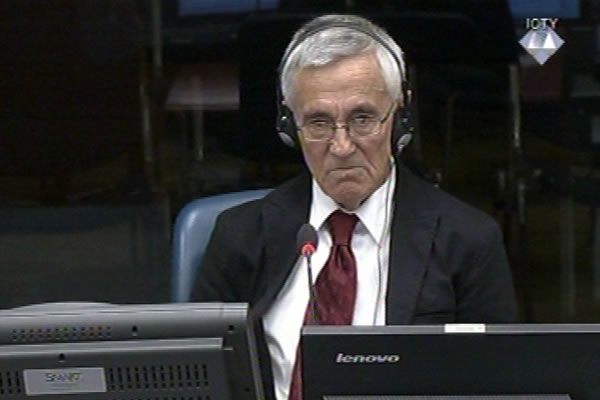Home
PROSECUTOR IGNORES WITNESS’S EULOGIES ABOUT MLADIC
In the cross-examination of Ratomir Maksimovic, former officer in the Sarajevo-Romanija Corps, the prosecutor paid no attention to the witness’s claims that the accused was ‘a capable, energetic and modest’ soldier, devoted to ‘the tradition and chivalry’ of the Serb army. Instead, the prosecutor focused on interrogating the witness about the structure and role of the Bosnian Serb army in the Sarajevo theatre of war
 Ratomir Maksimovic, defence witness at Rako Mladic trial
Ratomir Maksimovic, defence witness at Rako Mladic trial During the war in BH, naval officer Ratomir Maksimovic had to take up duties that had nothing to do with his specialty several times: he served in the department for moral guidance in the Sarajevo-Romanija Corps command and held other posts in the Corps area of responsibility. In his testimony in Ratko Mladic’s defense, Maksimovic repeated the claims he had made when he testified in Radovan Karadzic’s defense. The claims are less than original: the Corps only fought defensive actions, the Serb army was poorly trained and small, and the enemy held the upper hand in the Sarajevo theatre of war.
In his evidence at Mladic’s trial, the witness supplemented those stock tales with his recollections of the wartime encounters with the accused. As Maksimovic said, he met Mladic at least five times in the VRS Main Staff in Han Pijesak and in the area of responsibility of the Sarajevo-Romanija Corps. Maksimovic got the impression that Mladic was an officer dedicated to ‘the tradition and chivalry’ of the Serb army. He never spoke offensively about the enemy. ‘I believe that Mladic found the war difficult, but he had to stand at the head of the Serb army so that history wouldn’t repeat itself’, Maksimovic noted.
Speaking about the character of the accused, the witness said that the accused was ‘a capable, energetic and modest’ officer who visited his soldiers whenever he could and gave them ‘fatherly advice’. According to the witness, it would never occur to Mladic to order attacks on the Muslim civilian areas. In fact, Mladic refused to even entertain any proposals for offensive operations against the enemy army which had strategic objectives.
Maksimovic’s eulogies of the accused obviously failed to impress prosecutor Weber, who dedicated the cross-examination to the Sarajevo-Romanija Corps structure and its wartime activities. Confronted with the evidence about the strength and training of the Serb soldiers in the Sarajevo theatre, the witness was often evasive in his answers. This prompted presiding judge Orie to repeatedly warn the witness not to ‘try to leave the subject’. The witness should bear in mind, the presiding judge stressed, that he was called to give evidence before the Tribunal, not to give lectures.
In his statement, the witness accused the ‘Muslim side’ of spreading disinformation about random Serb attacks on Sarajevo. This prompted the prosecutor to show a document produced by the department for moral guidance, which was headed by the witness. The document states that the Corps should ‘mask its own intentions and instigate conflict in the enemy ranks’ by ‘enacting plans to disseminate disinformation’. Maksimovic rejected the allegation, saying he was ‘beginning to suspect the credibility of the document’.
The prosecutor also noted that extremist Chetnik volunteers run by the Serbian Radical Party, including the groups led by warlords Slavko Aleksic and Jovo Ostojic, fought side by side with the units of the Sarajevo-Romanija Corps. The witness tried to play down their role, but didn’t deny that those units were part of the Corps.
As today’s hearing drew to a close, Mladic’s next defense witness Mile Ujic began his testimony. Ujic is a local politician and a Bosnian Serb army soldier from Rogatica.
Linked Reports
- Case : Mladic
- 2014-10-14 PRISONERS WERE KILLED IN LINE WITH GENEVA CONVENTIONS
- 2014-10-13 ROGATICA TEEMING WITH MUSLIM ‘VOLUNTEERS’
- 2014-10-02 CONTRADICTORY VIEWS OF SANSKI MOST CONFLICT
- 2014-10-16 CRIME COMMITTED BY ‘DERANGED PERSON’ OUT OF MLADIC’S CONTROL
- 2014-10-20 RESPONSIBILITY OF THE ARMY FOR EXECUTION OF PRISONERS IN RASADNIK FARM
- 2014-10-21 HOW FOCA BECAME SRBINJE
